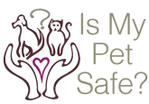On Easter, Is Your Cat Safe?
Holidays unfortunately can be very dangerous times for pets. Often, dogs receive much of the focus on this issue as well, they can be goofy and chow down just about anything they find. Cats, however, are generally more reserved (some might say refined) and edible dangerous to them are not as widely known. IMPS brings your attention to Easter and the very real danger of lily plants to felines.

Background
Many homes are decorated with seasonal plants, either purchased directly or received as gifts. Though pet parents take as given that cats like to nibble on plants, their knowledge of which ones can make their cat sick or even cause death may be lacking. At Easter, lilies are the traditionally festive plant and they are feline killers.
Lilies are a large family of plants, but pet parents should be most concerned with those of the Lilium and Hemerocallis genus. Latin, I know! Examples of the former are Easter lilies, the latter Tiger or Day lilies. Lilium come from bulbs, Hemerocallis are tuberous. The key thing to remember is that all parts of the plant are toxic.
Symptoms
What if you are reading this only after bringing a lily plant into your house? The most common symptoms of a cat who has ingested some part of a lily plant are, in no particular order:
- diarrhea,
- vomiting,
- abnormal thirst,
- dehydration,
- seizures,
- lethargy
Depending how much of the plant has been eaten, death can follow quickly or take as long as a week absent treatment.
Treatment
If you suspect your cat has ingested any part of a lily plant (and not necessarily a holiday variety), take your cat to your vet immediately and if at all possible, bring a sample of the plant you think was eaten. Time is of the essence as organ damage can begin quickly; survival chances decline rapidly if treatment is not started within six hours! Your vet will be concerned in particular with the kidneys and looking for signs of renal failure.
The first thing the vet will do is try to remove any remaining plant pieces from your cat's stomach by inducing vomiting. Charcoal will be used to try to slow or prevent any further absorption of toxins. Next, your cat will be given intravenous fluids for up to 72 hours. The fluids are necessary to prevent dehydration and to increase the rate your cat excretes the lily toxins from its body.
Take Away
Pet parents must be aware of what items in their home can be toxic to their pets. The best way to prevent life threatening poisoning is to be sure such toxins are not present in your home at any time or at a minimum, stored securely.


